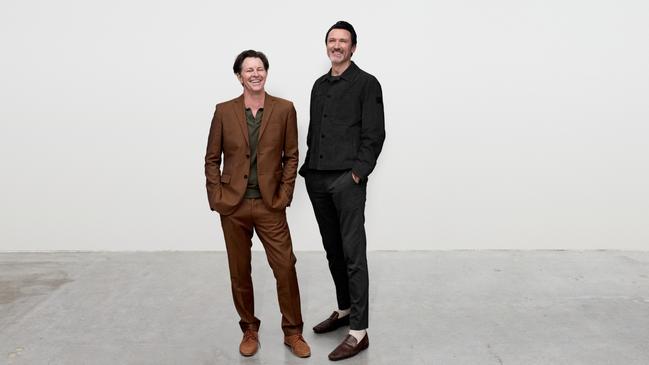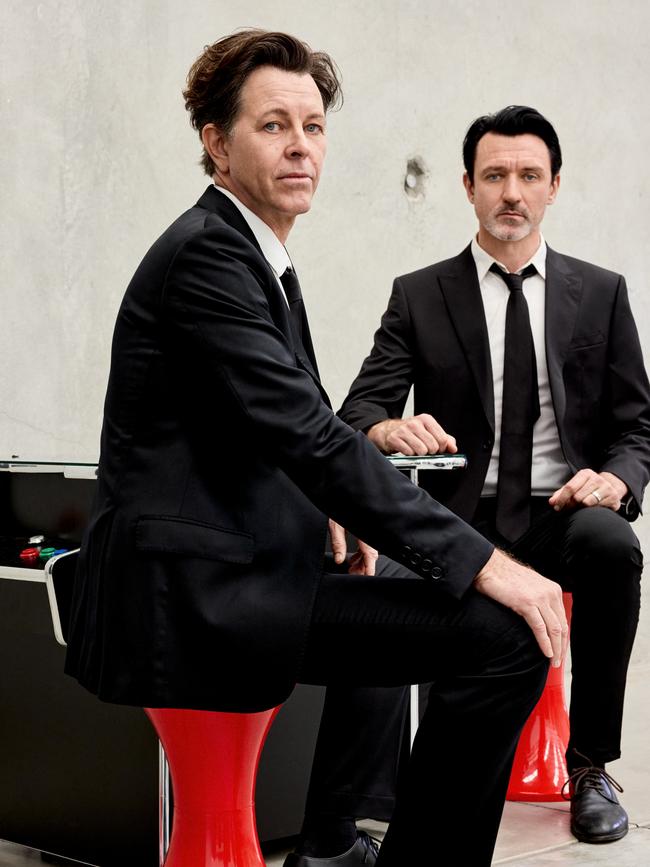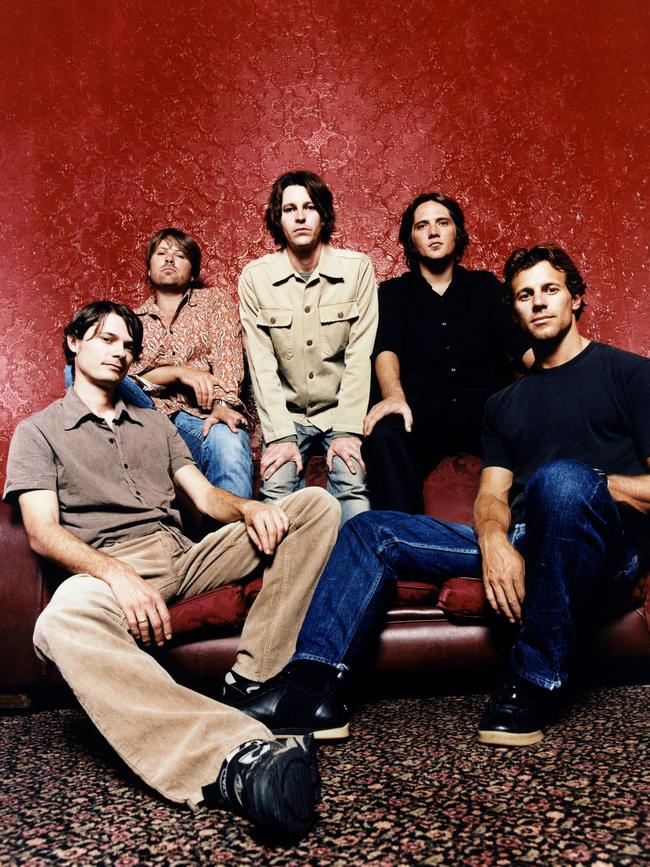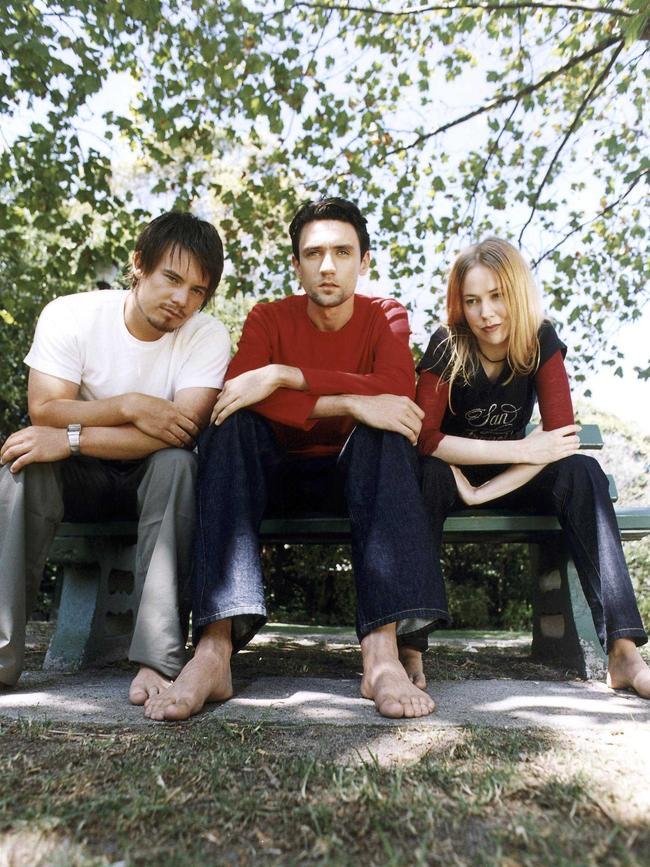New bromantics: Bernard Fanning and Paul Dempsey’s excellent adventure
An astute suggestion from a musical colleague led to a Nordic roadtrip and a surprising artistic collaboration between two of Australia’s best rock ‘n’ roll singer-songwriters.

So many of life’s pleasures sprout from being open and brave enough to say yes when the right moment presents itself. This notion forms the beating heart of improvisational theatre performers, whose two favourite words are short and sweet: “Yes, and ...”
When you give in to this assenting mode of thinking, there are no bad ideas – only new ones to be inhaled with the fresh scent of curiosity.
Bernard Fanning didn’t really know what he was getting himself into, then, when he sent Paul Dempsey a link to an article topped with a gorgeous photograph of a remote recording studio situated in Nordic climes on the edge of the Atlantic Ocean.
“Hey, maybe we should go to Norway and record our album,” wrote Fanning in a text message, assuming that his far-fetched suggestion would be received as intended – as a joke.
“Yep,” replied Dempsey.
That short, sweet response set in train a series of events that would establish the foundation of a surprising and invigorating artistic collaboration between two of Australia’s best rock ’n’ roll singer-songwriters.

Fanning had been on friendly terms with Dempsey for a couple of decades, in the usual manner of industry colleagues exchanging backstage pleasantries at concerts and festivals while playing gigs with their respective bands, Powderfinger and Something For Kate, both of whom rose to prominence in the blossoming national alternative rock scene of the mid 1990s.
More recently, the groundwork for solidifying a friendship was laid when they performed at a David Bowie tribute concert held at the Sydney Opera House in early 2017. There, backed by esteemed players from Bowie’s live bands and alongside Sarah Blasko, the pair made guest vocalist appearances while indulging their shared love for all things Ziggy Stardust, Starman and beyond.
Later, during the Covid lockdowns, Melbourne-based Dempsey staved off Groundhog Day tedium by stepping into an empty bedroom upstairs and transforming it into a home studio, where he worked on a raft of musical projects.
As well as appearing in Review’s Isolation Room series, where he performed a stunning solo version of the 2020 SFK single Situation Room, he tapped some colleagues to collaborate on cover songs aimed at lifting the spirits of those locked down at home.
For this, he asked Fanning to duet on Under Pressure, the chart-topping 1981 single by Queen and David Bowie. Dempsey recorded and filmed his acoustic guitar and vocal parts in the empty bedroom, and then all his interstate mate had to do was record his vocals – plus finger-snaps and claps – at his own studio, at home in Byron Bay.
“I did a few of them, but Under Pressure was the first one,” Dempsey tells Review. “We had been hanging out shortly before the pandemic, because Something For Kate recorded our last album (2020’s The Modern Medieval) in Bernard’s studio. I’m glad we did it that way, instead of trying to livestream it into an iPhone. I wanted it to be good. I just thought, ‘There’s got to be a way of doing this music-on-Instagram thing where you can quality-control it a little bit, so that people might watch it again and again.’ Which they have done.”
They certainly have: the pair blended beautifully in the stripped-back arrangement, with Dempsey hitting some spine-tingling, Freddie Mercury-esque high notes that caused Fanning to raise his eyebrows skyward on camera.
Their extraordinary duet has notched 180,000 YouTube views since it was posted in August 2020, and it wasn’t until February 2021 that they got the chance to perform it together live at Melbourne’s Myer Music Bowl, complete with plenty of joyous crowd participation.
It was backstage after that show where Dempsey’s wife, Stephanie Ashworth, clocked the musical bromance that had been bubbling away for years and found a way to turn their talk into action.
With a rock bassist’s sense of impeccable timing – for bass is the instrument she plays in Something For Kate – Ashworth walked over to her husband and his offsider, and offered up something that was a cross between a suggestion, a dare and a threat: “You two should just make a f..king record,” she said. No pressure.
“She’s the ‘ideas man’,” Fanning tells Review with a laugh, as they unpack the long and winding origin story behind their debut duo album, as we chat over coffees in Melbourne on a cold Monday in early July.
At this, Dempsey smiles at his friend and adds the perfect “Yes, and ...” rejoinder to this anecdote, by proudly stating: “She’s the ‘ideas man’ in my marriage.”


Challenge accepted. It sounded like a good idea, so they inhaled long and deep. Perhaps the true seed of what’s now known as Fanning Dempsey National Park – a band name chosen “because it’s so pompous that it made us laugh every time we said it” – was planted with those eight words spoken by Stephanie “Ideas Man” Ashworth in early 2022.
Both songwriters by trade, by reputation and by pure bloody-minded habit, there was no shortage of songs in both of their kit bags. Amid work and family commitments, they beavered away on ideas and sent them to one another, each fulfilling the roles of sounding board, cheerleader and counsellor as required.
It was somewhere in this period that Fanning was researching online for Brooklet Recording, the Byron Bay studio he co-founded with Nick DiDia, when he came across an article listing the world’s most scenic recording studios.
One of those mentioned was Ocean Sound, situated on the tiny island of Giske, whose recording clientele since opening in 2009 has included Arcade Fire, Flume and Norwegian pop artist Sigrid, among others.
Cue: Fanning’s joke text to Dempsey.
Cue: assenting response, followed by surprise, then an email to the oceanside studio owners.
“I thought it was going to be impossibly expensive,” recalls Fanning, 54. “It’s really remote; it’s on an island on the west coast, halfway up Norway. If you look west, there’s nothing; it’s just Atlantic Ocean. But it was actually pretty reasonable (price-wise). They were totally up for us coming, and made us feel really excited about doing it. So we were just like, ‘OK, f..k it!’”
Cue: a week spent at Ocean Sound, surrounded by a stunningly beautiful panorama, just like the article said they would be.
At this point in the story, Dempsey jumps in to clarify something. Though they’d been writing and recording remotely, their actual face-time had been almost non-existent.
“It was all happening via Dropbox,” he says. “So after nearly 18 months of that, I said, ‘Let’s build a bit of a road trip into it and actually hang out.’ So we flew into Bergen, and did a two-day drive to get to where the studio was, because we hadn’t hung out. We owed ourselves an adventure to get this started properly.”
Cue: bromance hits the road, as these two Australian rock stars got to know each other properly for the first time in their lives while far, far from home. Dempsey, 48, was the driver, which meant Fanning was largely in charge of the playlist.
“We talked most of the time, actually,” says the Powderfinger frontman. “But he did make me listen to (metal bands) Mayhem and Darkthrone.”
“I took Bernard to Apollon, the record store in Bergen, where the whole Norwegian black metal scene originated,” says Dempsey, smiling. “We made a little pilgrimage.”
“I was ready for all these heavy-duty cats to be there – but we got there and it’s all this beautiful, mid-century Nordic architecture, and when I walk in, the first record I see is Simon and Garfunkel,” says Fanning, laughing. “Oh, for f..k’s sake! I’ve got that record!”
Naturally enough, the two musicians compared and contrasted the landscape they were seeing to the wide open spaces of their homeland, which is girt by sandy beaches. Not Norway, which is mountainous in the extreme, and whose coastline is often composed of steep cliffs that become waterfalls as glaciers melt in the Nordic summer.
“You can’t go over anything; it’s too sheer,” recalls Dempsey. “So to get anywhere, it’s only ‘tunnel through’. When you’re in that place, you can easily understand why they have a god whose whole deal is that he has this massive f..king hammer that can break rock – because the whole place is just rock, so it’s no wonder the rock-smashing guy (Thor) is the ultimate dude.”
Their week at Ocean Sound was a great way to feel out and flesh out their prospective ideas while recording some demos. Dempsey is an accomplished drummer – and a heavy metal fan from way back, hence his urge to indoctrinate Fanning – and they’re both handy guitarists and pianists, so they could easily track parts with an engineer to get a sense for how the songs were shaping up.
“It was a really good idea – and none of it ended up on the record,” says Dempsey with a laugh.
Just before their trip to Ocean Sound, the pair had met in London with producer Craig Silvey, whose CV includes albums by Arctic Monkeys, The National and Florence and The Machine. Impressed, they wanted to work with him, but decided to press on with their plans.
“We went to Norway with that kind of ‘let’s just see what happens’ idea,” says Fanning. “And we realised that having a third (side) of the triangle would really help, as opposed to either of us having to captain, or even co-captain. It was just better having somebody who could be that last layer of oversight.”
Read enough rock ’n’ roll interviews and you might suspect a producer’s role in an album’s creation can be overstated or inflated, depending on the egos of those involved. This is not one of those stories.
“He had a really big influence on it in the end,” says Fanning of Silvey, “because when we’re left to our own devices, we will put a thousand harmonies on something, or ‘guitarmonies’, or whatever. He actually stripped most of that; he was like, ‘You don’t need it. This is too warm.’ He wanted to chill the record down; he wanted to make it (sound) ‘colder’, by having these high-energy beats, rhythms and riffs, and the arpeggiated (synthesiser) stuff has a coldness to it that a bass guitar doesn’t. He just had a really good overall vision.”
Sitting across from his new bandmate, Dempsey nods and sums up the producer’s approach to the album: “He told the story with fewer and better words, instead of a flowery, ornate vocabulary.”
As for the 10 songs that comprise their debut? They’re probably not what most would expect.
Lead single Disconnect, released in May to announce the project, had the two singer-guitarists trading lines amid a bustling pop arrangement coloured by synthesiser and saxophone, before harmonising in a shimmering chorus.
Given their respective rock pedigrees, it was an eyebrow-raising left turn, as intended. “There was no point making the record that everybody would assume that we would make, because that would be as boring for us as it would be for everybody else,” says Dempsey.
What would that expected, assumed music sound like? “Oh, just like a cross between Powderfinger and Something for Kate,” he replies. “And it isn’t that.”
“People would expect, I guess, rock ballads,” Fanning chips in.
“Acoustic guitars, and anthemic choruses,” says Dempsey.
They’re smiling as they trade these ideas back and forth, and the shit-stirrer in each of their personalities clearly enjoys the fact Fanning Dempsey National Park essentially subverts what their significant, respective audiences might think they’re getting from these two men joining forces.
After their Norway jaunt, they didn’t scrap the songs, but instead borrowed Silvey’s production brain to reshape the demos. Top of his list of rearrangements was the need to present the songs as played by a five-piece band, rather than two blokes tinkering away and laying down tracks.
Accordingly, The Deluge features three esteemed American players: drummer Michael Urbano, bassist Craig McFarland and synth player Adam MacDougall, who gathered at 2200 Studios in San Francisco midway through last year.
There’s a gorgeous love song in fifth track Blood. In its opening lines, Fanning channels those early days of caring for a newborn:
It’s 10 to five, I’m barely alive
You’re bursting with song
The glistening stars have gone home
There’s a long day ahead
So catch your breath
For the good thing to come
You just have to blink and those days are gone ...
At 54, his kids are now 12 and 14; Dempsey’s are aged eight and 13. Was it a challenge to revisit those bleary-eyed days of new parenthood for songwriting purposes?
“Not really,” replies Fanning. “Some element of the lyric had come from when my kids were younger, and kicked off the whole idea. I think our brains are kind of programmed to forget how f..ked it is, so that you’ll just keep reproducing. There’s a certain amount of memory-diving in that, but you see it sometimes when you see a new parent in the supermarket and they’re like The Walking Dead.”
Second track Born Expecting is a most curious lyric, given that it’s directed at the character of former prime minister Scott Morrison, as Dempsey sings:
Sincerest replica
Dear middle management mind
Fail upwards every time
You breezed the test
You’ve got the best empathy
Other people’s money can buy
You don’t have to make up sin
To be a good sinner
When everything you need
Just trickles down from heaven ...
Blood is a love song; does that make Born Expecting a hate song?
“Yes,” replies Dempsey.
“Emphatically yes,” says Fanning, laughing.
“Look, ‘hate’ is not a word I like using,” says Dempsey. “But yeah, it’s born out of frustration – no pun intended; frustration with the culture of entitlement and the mechanisms by which certain people end up in certain positions, and believe that they belong there, and that they’re entitled to be there. But look, when someone’s character is just so easily attackable ...”
“It’s almost like low-hanging fruit with Scott Morrison, wasn’t it?” adds Fanning with another laugh. “But it still needed to be said. And that runs through all brands of politics, anyway. It’s directed at his incompetence and entitlement, but it can be more generally applied to dozens and dozens of politicians around the country, and around the world. Boris Johnson’s another perfect example, isn’t he? And Rishi Sunak?”
This sort of political critique appearing in their songs is nothing new for either musician: both had a crack at aspects of John Howard’s stint as prime minister, in Powderfinger’s Like A Dog (2000) and Something For Kate’s Best Weapon (2003), which respectively attacked Howard’s reluctance to address Indigenous reconciliation and his enthusiasm for joining the Iraq War.
The penultimate song, Dunning Kruger National Park, mentions a “deep fake sunrise” created by artificial intelligence and “fact-check freedom fighters”, while its title borrows from the cognitive bias whereby people with limited competence tend to over-estimate their abilities.
It’s a decidedly pointy-headed concept to wrap into a five-minute song, but this is that sort of album: full of surprises. The track ends with the two frontmen and their band rocking as hard as any other song in their respective catalogues.
As it builds to a triumphant conclusion, it acts as a pointed reminder that this entire project emerged from a willingness to try new ideas. Someone they love and trust said these two should make a f..king record, and they said, “Yep”.
The Deluge is out now via Dew Process/Universal. Fanning Dempsey National Park’s eight-date tour begins in Brisbane (October 11) and ends in Brisbane (November 9). The writer travelled to Melbourne as a guest of Dew Process and Universal Music Australia.





To join the conversation, please log in. Don't have an account? Register
Join the conversation, you are commenting as Logout